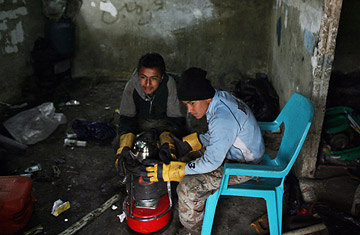
Palestinian boys warm up next to a kerosene heater at a mechanics workshop in the Baqaa refugee camp near the Jordanian capital Amman on February 19, 2008.
Al-Khateeb is a humanitarian worker based in Baghdad, where she works for the non-profit group Iraqi AlAmal Association. A former program coordinator for the U.N. Development Fund for Women (UNIFEM), she rallied women to participate in Iraq's first elections and now uses her twelve years of technology experience helping local women learn e-business software.
Iraq Before 2003
We've been through 13 years of sanctions. We've been through two gulf wars. We had a traditional war with Iran — a lot of casualties. We were barely trying to survive. Being an Iraqi woman, actually trying to have a family — I have three daughters. Just surviving the sanctions.
On life after Saddam
We had a really bad situation before our infrastructure was demolished, but after 2003, it was chaos. There was no rule of law. After 2003, everybody's wearing a mask. After 2006, nobody is wearing a mask, they just do whatever [they want], they're not afraid of anyone. You don't have to work [as a] humanitarian actually. You're living in crisis, you find your way out and just survive it. In Iraq, you have to provide electricity, water, everything for yourself.
On becoming an aid worker
Iraq civil society has no background before 2003. It was all controlled by government, a totalitarian regime. Iraqis couldn't do any humanitarian work — government does everything. You're not allowed to question anything. If you question it, either you're persecuted or you're an outlaw. After 2003 July, I joined UNIFEM and NGOs started to form in Iraq, women NGOs. They were quite active in thinking of the future, trying to make something. After 2005, it was really difficult, [there were] a lot of humanitarian violations. Networking was completely something new to the Iraqi culture. This kind of work gave hope.
On women's rights in Iraq
We have women who have been working professionally in administrations and institutes, but they're not aware about their rights. In the beginning, women were collateral damage, but now we feel that they're targeted. We have a lot of unprecedented incidents of women [being] brutally killed. Reports being collected do not mention any investigation, nobody speaks about it. People who speak about it, humanitarian workers, are persecuted and threatened. Journalists are also threatened. So nobody is speaking on it or taking any measures.
